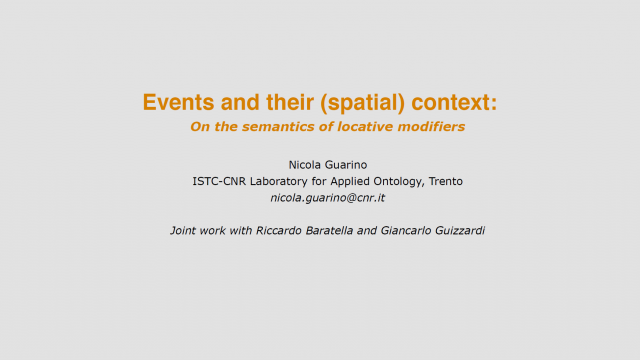ThinkSpatial: Nicola Guarino

Events and their (Spatial) Context: On the Semantics of Locative Modifiers
Nicola Guarino
ISTC-CNR Laboratory for Applied Ontology, Trento
Abstract: The notion of event is intimately connected to that of context. Describing an event means not just saying what happened, but also specifying how it happened, by adding details (generically called modifiers) that often involve the broader context where the event occurred. These modifiers often express locative information. But what are we referring to, when we add a locative modifier? This is an issue that has been investigated in the literature on linguistic semantics (especially by Claudia Maienborn), and is still rather open. Consider for instance “Maradona signed the contract in Argentina” versus “Maradona signed the contract on the last page.” While in the first case the modifier clearly denotes the location of the signature event, in the second case it refers to the location of something else. Similarly, in “John kissed Mary on the boat” the semantics of the locative modifier is clear, but in “John kissed Mary on the cheek” the semantics is different. In this talk, I will present a novel theory of events that explains these phenomena in terms of relationships between the modifier and the event’s context. It is a sort of microscopic approach based on the Aristotelian theory of change, according to which the actual subjects of change are individual qualities inhering in the participants, and not the participants themselves. In this view, an event (in its simplest form) is a single quality manifestation, i.e., the occurrence of a change (or unchanged) with respect to one of its qualities. More generally, ordinary events are clusters of quality manifestations, consisting of a focus accounting for what happens, and an internal context accounting for how it happens. Event kinds provide criteria to carve up events from the broader context by determining their focus and their internal context.
Bio: Nicola Guarino is a retired research associate at the Institute of Cognitive Sciences and Technologies of the Italian National Research Council (ISTC-CNR), and former director of the ISTC-CNR Laboratory for Applied Ontology (LOA) based in Trento. Since 1991 he has been playing a leading role in the ontology field, developing a strongly interdisciplinary approach that combines together Computer Science, Philosophy, and Linguistics. The impact of such an approach is testified by a long list of widely cited papers and many keynote talks and tutorials in major conferences involving different communities. Among the most well-known results of his lab, the OntoClean methodology and the DOLCE foundational ontology. Guarino has been the founder and editor-in-chief (with Mark Musen, Stanford University) of the Applied Ontology journal, founder and former president of the International Association for Ontology and its Applications (IAOA), and editorial board member of Int. Journal of Semantic Web and Information Systems and Journal of Data Semantics. He is also a founding member of the Italian Association for Artificial Intelligence and fellow of the European Association for Artificial Intelligence (EurAI).
On the theoretical side, Guarino’s current research interests are focusing on the ontological foundations of knowledge representation and conceptual modeling and specifically the ontology of events and relationships (collaborating with Giancarlo Guizzardi to the new version of the UFO ontology), while on the application side his research is focusing on enterprise modeling and the ontology of economics. He is also interested in leveraging ontological analysis and semantic technologies to improve cognitive transparency, social accountability, and the participatory governance of artificial intelligence artifacts.
The objective of the ThinkSpatial Forum is to exchange ideas about spatial perspectives in research and teaching, broaden communication and cooperation across disciplines among faculty and graduate students, and encourage the sharing of tools and concepts.